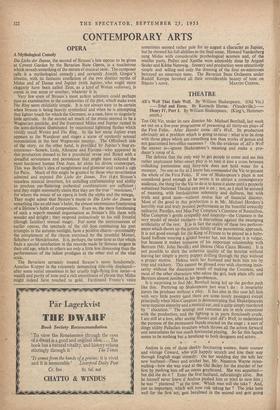CONTEMPORARY ARTS
OPERA
A Mythological Comedy Die Liebe der Danae, the second of Strauss's late operas to be given at Covent Garden by the Bavarian State Opera, is a touchstone which reveals something of the nature of musical taste. The composer calls it a mythological comedy ; and certainly Joseph Gregor's libretto, with its fantastic conflation of the two distinct myths of Midas and of Danae and Jupiter (with Jupiter, who might more elegantly have been called Zeus, as a kind of Wotan redivivus), is comic in one sense or another, whatever it is.
Very few even of Strauss's most ardent admirers could perhaps pass an examination in the complexities of the plot, which make even The Ring seem childishly simple. It is not always easy to be certain when Strauss is being heavily symbolical and when he is attempting that lighter touch for which the Germans, as a race, have so singularly little aptitude. In the second act much of the music seemed to be a Wagnerian pastiche, and the frustrated Midas and Jupiter ranted in the semi-darkness illuminated by occasional lightning flashes which vividly recall Wotan and The Ring. In the last scene Jupiter even appears as the Wanderer and stages a scene of opulently sensual renunciation in the best Wagnerian manner. The Offenbach side of the story, on the other hand, is provided by Jupiter's four ex- mistresses—Semele, Leda, Alkmene and Europa—who appeared in this production dressed as for a provincial revue and flirted with a dreadful seriousness and persistence that might have sickened the most hardened human Don Juan, let alone his divine counterpart. This was Berlin's idea of naughtiness and glamour and raised a sigh for Paris. Much of this might be granted by those who nevertheless admired and enjoyed Die Liebe der Danae. For th in Strauss's ceaseless musical invention, his unfailing craftsmanship and ability to produce ear-flattering orchestral combinations are sufficient ; and they might reasonably claim that they are the true " musicians," for whom the music of an opera is both the alpha and the omega. They might admit that Strauss's music in Die Liebe der Danae is something like an old man's habit, the almost unconscious functioning of a lifetime's habit of composition. Even so, the mere functioning of such a superb musical organisation as Strauss's fills them with wonder and delight ; they respond instinctively to his still forceful (though familiar) sensual magic. For some the reminiscences of earlier operas, the spectacle of the old lion ruminating his past triumphs in the autumn sunlight, have a positive charm—presumably the complement of the charm exercised by the youthful Mozart, Schubert or Mendelssohn. It is, perhaps, the same taste as that which finds a special satisfaction in the records made by famous singers in their old age, which to others are only a little less distressing than the performances of the infant prodigies at the other end of the vital scale.
The Bavarians certainly treated Strauss's score handsomely. Annelies Kupper in the extremely demanding title-role displayed— after some initial uneasiness in her cruelly high-flying first scene—a wealth and purity of tone and a rich smoothness of phrase that Midas might indeed have touched to gold. Ferdinand Frantz's voice sometimes seemed rather pale for so august a character as Jupiter, but he showed his full abilities in the final scene. Howard Vandenberg sang Midas with considerable psychological acumen and, of the smaller parts, Pollux and Xanthe were admirably done by August Seider and Kathe Nentwig. Scenery and production were attractively simple and telling and only the dressing of the four ex-mistresses betrayed an uncertain taste. The Bavarian State Orchestra under Rudolf Kempe lavished all their considerable beauty of tone on


































 Previous page
Previous page